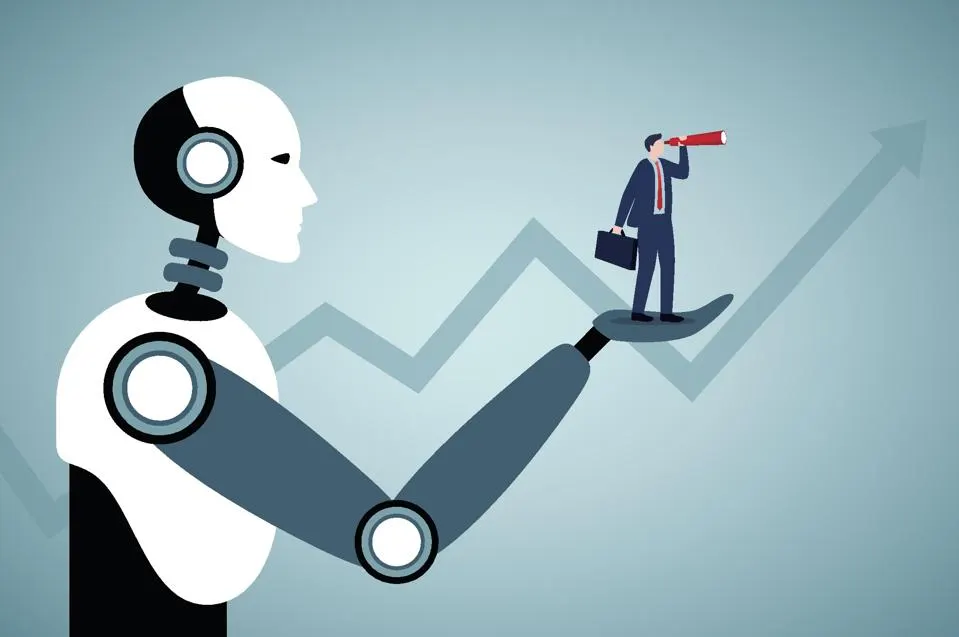Economics & Finances
Why Financial Executives Must Take a Leading Role in Artificial Intelligence Adoption for their Businesses
6 Minutes read

Insights from the Expert Insight “Artificial Intelligence for Financial Executives”.
In his March 2023 GatesNotes post, Bill Gates said, “The development of AI is as fundamental as the creation of the microprocessor, the personal computer, the Internet, and the mobile phone. It will change the way people work, learn, travel, get health care, and communicate with each other. Entire industries will reorient around it. Businesses will distinguish themselves by how well they use it.”
Can you even remember when the internet, smartphones, and communication, travel, and learning apps were not ubiquitous? Think back, 10, 20, 30 years. It seems incomprehensible, doesn’t it? How did we get anything done back then! We have such short memories… and they are about to get shorter!
Azeem Azhar predicts an exponential acceleration of disruptive change, which will transform the fundamentals of everything again. In his book, “The Exponential Age: How Accelerating Technology is Transforming Business, Politics, and Society,” he refers to moments of radical change within a system as a “phase transition.” He writes, “When liquid water turns to steam, it is the same chemical, yet its behavior is radically different. Societies, too, can undergo phase changes.”
We are going through another phase transition, and this time it likely won’t take 30 years, or 20 years, or perhaps even 10 years!
Some of you may already be deploying specialist AI applications for narrow use-cases, dealing with the deep complexities of your business. Some of your designers and creatives may already be utilizing ChatGPT from OpenAI and other Generative AI applications to enhance their work products.
Soon, AI usage will become ubiquitous, especially with Microsoft, a significant investor in OpenAI/ChatGPT, releasing “Co-Pilot” into its Microsoft 365 office suite. Microsoft states, “Humans are hard-wired to dream, to create, to innovate. But today, we spend too much time consumed by the drudgery of work, on tasks that zap our time, creativity, and energy. To reconnect to the soul of our work, we don’t just need a better way of doing the same things. We need a whole new way to work. Today, we are bringing the power of next-generation AI to work. Introducing Microsoft 365 Copilot — your copilot for work.”
The challenge ahead lies in effectively navigating these advancements to achieve positive productivity impacts and build capabilities.
CFOs and senior financial executives have always been the arbiters of investments, seeking the return-on-investments to materialize as theorized in the business case, to build capabilities that create value (The CFO’s Role in Capability Building).
You have always been integral to managing the innovation funnel of your business, through a financial lens of investment and return-on-investment. Now, more than ever, this role will be crucial when considering Artificial Intelligence investments, for which your innovation funnel must be prepared. The key lies in finding the balance between not investing too little too late and not investing too much too soon—progressively accumulating a 1.0/3.0/3.0 snowball effect.
Artificial intelligence innovator and expert Manuj Aggarwal urges CFOs and senior financial executives to:
Career CFO, Board Member, and REF partner in San Diego, Mark Neilson urges CFOs and senior financial executives to:
You can hear more from Manuj, Mark, and myself in our Expert Insights webinar entitled “Artificial Intelligence for Financial Executives” where you can find a recording.
During the webinar, we polled participants, and there was a very high alignment with the role CFOs/Financial Executives need to play.
Collectively, we urge you to decide to become students of AI. Your future depends upon it more than you realize. Reflect on the past 30 to 35 years when the internet was just emerging on the fringe of your radar scope. Consider all the internet-related investments you have been responsible for—Websites, Apps, Cloud Platforms, Collaboration Tools, Enterprise Systems, and much more, all of which rely upon the internet to function. Similarly, the importance of AI will grow rapidly, but it won’t take 35 years, maybe not even 35 quarters or months. We are going through a next phase transition.
We have witnessed numerous instances where managing the complexities of a phase transition of exponential change proves challenging. It is easy to fall into the trap of either oversimplifying or overcomplicating the challenge and opportunity. These lessons are often learned with 20/20 hindsight when the consequences have been paid, leading to what we can call a “Kodak moment”! Despite being the pioneers of digital camera technology, Kodak failed to adapt its business model to remain at the forefront of the phase transition.
The “Kodak moment” is an overused example, similar to other companies like Blackberry and Blockbuster. It is often portrayed as a lack of intelligence within the organization, which is far from the truth. In reality, companies like Kodak had exceptionally intelligent individuals, just like you. However, they struggled to harness their collective intelligence organizationally to navigate a successful migration path.
